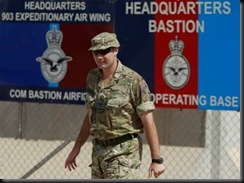
Britain's connection to jihad in South Asia was once again cast into the spotlight with the capture of two British nationals with alleged links to the Taliban in Herat. The man and woman remain unidentified, and the British Ministry of Defense and Foreign Office have both merely confirmed that they were British nationals. Stories have started to circulate in the press that they were plotting an attack back in the U.K. and it seems that they were dual Afghan-British nationals known to MI5, though other reports indicate they may be of Pakistani origin. Whether they were planning an attack in the U.K. or not, the prospect of British nationals fighting British soldiers in Afghanistan is something that has long worried British officials. Either way, their presence shows the connection between the U.K. and fighting in Afghanistan continues to exist, a demonstration of how ingrained extreme ideas continue to be in the U.K.
In many ways, this discovery is not that surprising. NATO forces have captured other European nationals fighting for their enemies in Afghanistan before, and there have been reports of British signals intercepts planes over the country hearing men talking in distinct regional British accents. Recently a picture surfaced in an extremist video showing "Musa the British" - a dead Taliban fighter with roots in the U.K. Most dramatically, a couple of years ago a story circulated that British forces had discovered a Taliban corpse with an Aston Villa tattoo. (Aston Villa is a Birmingham football team, one of Britain's cities with a large South Asian population.)
In the U.K. a number of cases have come before the courts in recent years highlighting the ongoing existence of a pipeline sending young men to fight alongside the Taliban (or al-Qaeda). Currently in Manchester a case is being heard against a cell of men that had formed around a former Taliban fighter who had relocated to the city. The group was allegedly using a stall set up for spreading religious messages in the city to try to recruit others to go and fight in Afghanistan. In June 2009 a court sentenced 21-year-old London lad Mohammed Abushamma to three-and-a-half years in jail for attempting to join the Taliban using a route through Turkey and Tajikistan. Abushamma admitted to police that he was seeking jihad in Afghanistan and, according to the prosecutor, emails he had sent his family "clearly indicated that he would be fighting with a Koran in one hand and an AK47 in the other."
Others appear to have successfully got through to join the fighting. Last year the Guardian told the story of the East London taxi driver who would every year go back during fighting season to join the battle against the occupying forces. As he boastfully put it, "there are many people like me in London....we collect money for the jihad all year and come and fight if we can." In a separate case, an Afghan suicide bomber who penetrated Kabul's Defense Ministry in April this year, Atiqullah Mangal, was allegedly radicalized in a British jail, having been smuggled into the U.K. as an illegal immigrant in 2001 and then incarcerated for violent assault. Upon deportation at the end of his sentence, he connected with the Haqqani Network and ended up leading an audacious assault that was supposedly intended to strike the visiting French Defense Minister.
And just the other day, a court in London further extended a control order (a government means of restricting an individuals movement whom they cannot incarcerate) against "BF" -- a British-born man of Pakistani descent who was allegedly connected to the Operation Crevice cell (Crevice was the first large-scale Islamist counter-terrorism operation in the U.K. to stop a plan to explode a fertilizer bomb on behalf of al Qaeda). "BF" is alleged to have travelled out to Pakistan in 2008 with a pair of brothers also connected to the cell who were fleeing control orders, and he returned carrying letters to pass on that were clearly referring to terrorism training. A year later he allegedly attempted to make the journey again, and this time was intercepted by British police and placed under restrictive custody.
Admittedly this latter path through Pakistan might not have ended up in Afghanistan, but at the same time this route is one that has been used repeatedly by British extremists in the past to go and join the Taliban. In mid-2001, the leader of the Crevice cell in the U.K., Omar Khyam, headed to Pakistan ostensibly to attend a friend's wedding, but instead connected with extremist networks and, in his own words to British journalist Richard Watson, travelled "all over Afghanistan...the Taliban are the most hospitable people in the world." At around the same time, Mohammed Siddique Khan, a British jihadist who was to achieve fame later as the leader of the July 7, 2005 cell, was making a very similar trip through Pakistan to Afghanistan. Khan had brought along with him another young Briton, Shippon Ullah, and the two of them trained at Harakat-ul-Mujahedeen camps where, according to Ullah, "we were treated differently because we had our own hut with two brothers from the United Arab Emirates."
This sort of jihadi tourism was something that primarily served the purpose of fundraising for the Taliban and providing young British men with an exciting experience during their summer holidays. But as was seen with both Khyam and Khan, the potential danger was that these young men could then be persuaded to take up arms against their own country at home. It is unclear at this stage what exactly these two in Afghanistan were doing, but their existence highlights that the jihadi pipeline between the UK and Afghanistan is alive and well.
Raffaello Pantucci is an Associate Fellow at the International Center for the Study of Radicalisation (ICSR) and the author of the forthcoming "We Love Death As You Love Life: Britain's Suburban Mujahedeen"
Lefteris Pitarakis-Pool/Getty Images
Read more:
http://afpak.foreignpolicy.com/posts/2011/07/22/talib_al_britani
